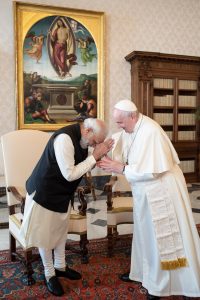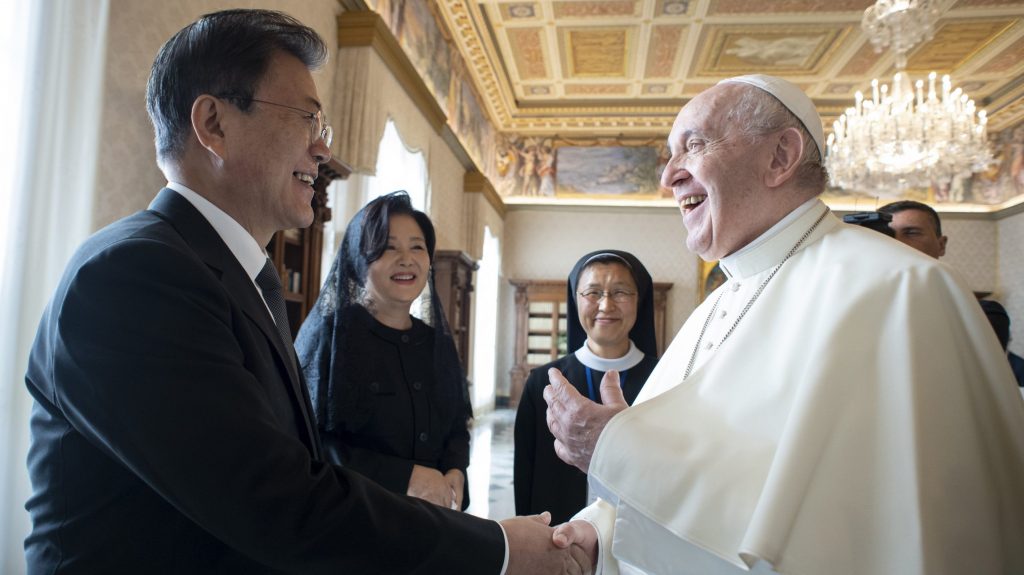In Rome for the G-20 summit, the leaders of South Korea and India also visited Pope Francis, and both of them had ideas for future papal travel.
The pope met with South Korean President Moon Jae-in Oct. 29, just before meeting with U.S. President Joe Biden.
Moon gave the pope a cross made out of barbed wire that came from the demilitarized zone on the border with North Korea. He accompanied the gift with a letter saying he hoped that cross and others made from the barbed wire would put down roots and peace would flower.
The president's office tweeted: "At the meeting held in the Apostolic Palace, President Moon said, 'If Your Holiness has the opportunity and pays a visit to North Korea, it will build momentum for peace on the Korean Peninsula.'"
"Pope Francis said if he received an invitation, he would gladly visit the North for the sake of helping Koreans and the cause of peace. He went on to say that South and North Koreans are brothers who speak the same language and that he would willingly go."
In early July, the head of South Korea's intelligence services told people at a Mass in Mokpo, South Korea, that he would meet with the president of the South Korean bishops' conference and the papal nuncio to South Korea to discuss the possibility of Pope Francis visiting North Korea.
When Moon had met Pope Francis at the Vatican in October 2018, the president passed on what he said was an invitation to visit from North Korean leader Kim Jong-un. The invitation was reported at the time by the South Korean news agency Yonhap, quoting Moon's press secretary.
The barbed-wire cross Moon gave the pope Oct. 29 was not the only piece he brought to Rome. More than 100 of the crosses were featured in a prayer exhibit at Rome's Church of St. Ignatius.

Attending the service after meeting the pope, Moon said: "Immeasurable strands of barbed wire are installed along the 250-kilometer-long (155-mile-long) Military Demarcation Line inside the Demilitarized Zone that cuts across the Korean Peninsula and divides it into the South and the North. As you know, the barbs on the wire are attached very close to one another and have very sharp edges."
Like the biblical swords being turned into plowshares, he said, the barbed-wire crosses are a sign of "the desire of many separated families in both Koreas to return to hometowns and meet relatives. They also hold the earnest wish and prayer of the people of the Republic of Korea to end the war for good and for the two Koreas to live in peace from this time forth."
Pope Francis met privately Oct. 30 with Indian Prime Minister Narendra Modi, who tweeted after his audience: "Had a very warm meeting with Pope Francis. I had the opportunity to discuss a wide range of issues with him and also invited him to visit India."
When he went to Bangladesh and Myanmar in 2017, Pope Francis had said he initially hoped to visit India and Bangladesh, but the arrangements were taking too long to make. The pope did not blame Modi's government for not inviting him, but it was generally known that no invitation was extended by the government, making the trip impossible.
Modi is a member of the Bharatiya Janata Party, a Hindu nationalist political party. While the Indian Constitution says the country is a secular state and protects freedom of religion and conscience, members of the BJP often are accused of inciting violence against non-Hindus, particularly Muslims.

